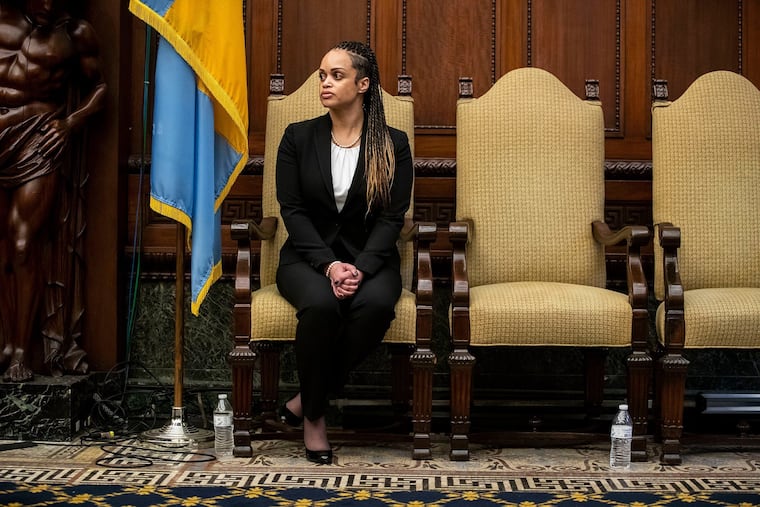Danielle Outlaw has a new city, and a lot of work to do as Philly’s next police commissioner | Mike Newall
And as an outsider, Danielle Outlaw is free from the bureaucracy and favoritism that can sink a homegrown commissioner. But it’s hard to envy someone coming from the West Coast into a place like Philly, with our numbing level of violence — and the poverty and inequality that shapes that violence.

When our new police commissioner arrives here in a month, she’ll be taking on the hardest job in the city.
Philly sure isn’t Portland. It’s not even Oakland, Danielle Outlaw’s hometown. It’s a city buckling under the toll of gun violence. It’s a department struggling to scrub out the stains of a past — and a present — that range from rank brutality to sexual harassment and insulting insensitivity. (Thinking of you, acting Commissioner Christine Coulter, and your oh-so-clever Rodney King T-shirt.)
That said, this is no thankless task. It’s a department of men and women that, at its everyday best, can build real trust, help communities regain their streets, and perform acts of heroism big and small.
And as an outsider, Outlaw will have certain advantages. Mainly, if she chooses to be, she’ll be free of the ball and chain of bureaucracy and favoritism that can sink a homegrown commissioner. She can chase real reforms instead.
But it’s hard to envy someone coming from the West Coast into a place like Philly, with our numbing level of violence — and the depths of our poverty and inequality that shape that violence. It can shock and overwhelm even the most hardened out-of-towners.
And building trust for Outlaw could be that much harder after what many have criticized as the secretive selection process that led to her appointment — those in communities most affected by crime and some of the most principled voices for reform in our city.
Like the Rev. Mark Tyler, the pastor at the historic Mother Bethel AME Church and a leading member of POWER, the group of clergy and activists demanding police reform — and transparency in selecting a new commissioner.
They didn’t get it.
But Outlaw would be wise to listen to those voices now. Take Tyler. He’s a fellow Oaklander, who also had to learn this city, and all its heartbreak and hope, for himself. He’s been here for 17 years, raised his two youngest children here. He loves Philadelphia.
“There’s a lot of concerns with activists — that the learning curve to know Philly is just too steep” for a newcomer, he said. “I disagree. I am an outsider. It depends on how she chooses to come into the city. My hope is she will spend a lot of time getting to know as many people in the community as she can.”
So, he’s cautiously optimistic. But he’s not naïve to the challenges.
And those challenges are so steep. Even our biggest strengths — like the fact that Philly truly is a city of neighborhoods — can present their own unique tests. In Oakland, it’s just east and west Oakland. The idea of being an Oaklander trumps any neighborhood ties. In Philly, it’s just the opposite.
“In some neighborhoods, you cross a street, and the perceptions of police change,” Tyler said.
Outlaw should follow Tyler’s recommendation and embark on a “listening campaign” around the city, building her own ties with those unheard voices.
But that will be a trial in itself: By the time Outlaw arrives in February, we’ll likely already be drowning in another tide of homicides — a tough time for get-to-know-you meetings.
Oakland, where Outlaw spent most of her policing career, long weathered punishing murder rates. So the violence in Philadelphia might not shock our new commissioner. It’s the despair that might.
“Poverty just feels different here,” Tyler said. “The condition of our public schools, the fact that we have become a city of meds, eds, and beds — but rising to the middle class is a dream that so many have given up on.”
For all the depths of our problems, though, Oaklanders and Philadelphians share more than just die-hard sports lunacy.
“In spite of all the negativity and all the challenges, there is something very resilient, a roughness,” he said. “People care so much about this city. It has a lot of fight in it.”
It does. As an outsider myself, that’s what I love most about our city.
The last time we had an outsider police commissioner in here, it was far from perfect. But Charles Ramsey made it clear that he was pushing for change — and set a tone that perhaps only an outsider could. In those years of progress, he envisioned a Philadelphia with fewer than 200 murders. It felt attainable. Now, as our murder rate inches toward 400, the highest it’s been a decade, that goal feels far out of reach.
It’s up to Outlaw to make it feel real again.